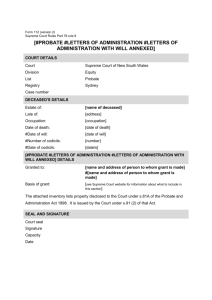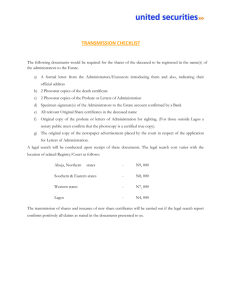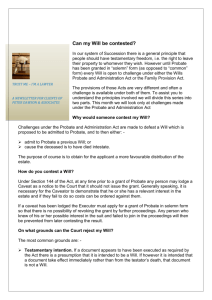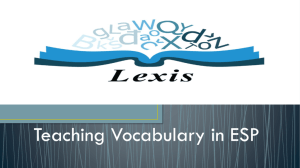SOME COMPARISONS OF SUMMARY ADMINISTRATION
advertisement
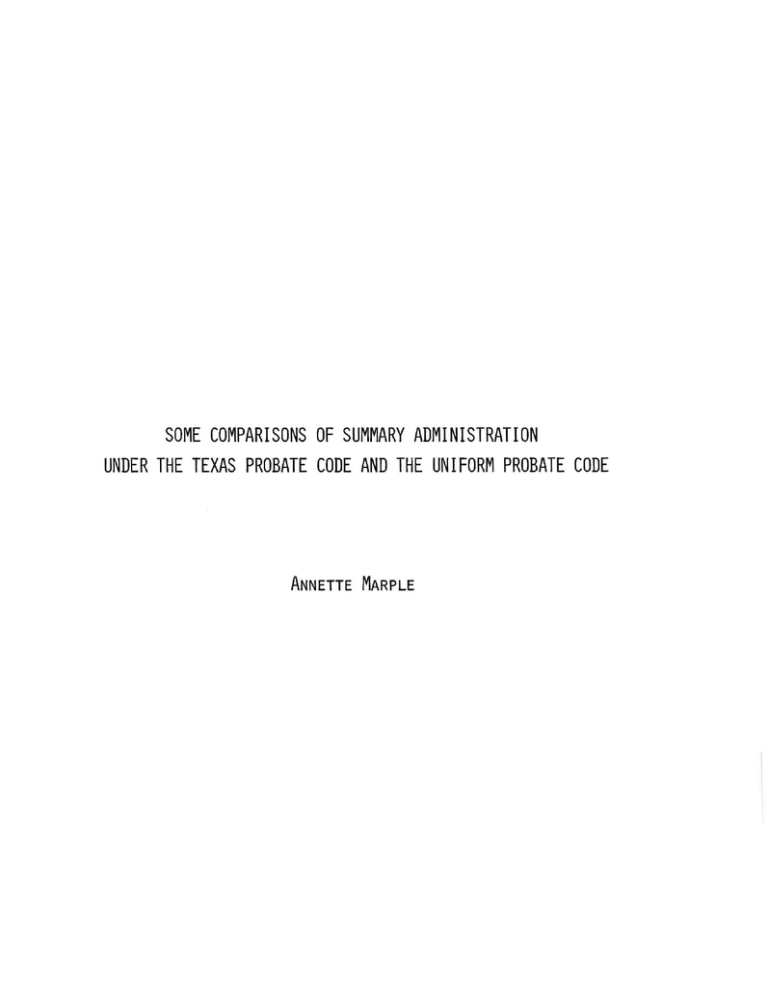
SOME COMPARISONS OF SUMMARY ADMINISTRATION
UNDER THE TEXAS PROBATE CODE AND THE UNIFORM PROBATE CODE
ANNETTE MARPLE
SOME COMPARISONS OF ' SUMMARY \ ADMINISTRATION
UNDER THE TEXAS PROBATE CODE, AND, . THE
UNIPORM
.
. PROBATE CODE
Since 1843 1 Texas has provided a form of 'summary administration 2 for its
, citizens in the settlement of their estates. ' The inclusion of "summary admin"':
, ".
""
' istration has become a
m~or
emphasis of reformers' efforts in current revisions
,of 'state probate laws .. 3 Many proposed state revisions incorporate features
of summary administration found in the \Jniform Probate Code. 4
Some of these
features may warrant examination by Texas "to determine if their assimilation
into its probate code would provide ' procedures ' which better serve the goals of
summary administration.
A study of the forms of summary administration developed in the Texas
Probate Code and the ,Uniform Probate Code reveal similar but not identical
goals.
Such a study raises two important questions: 1. What are the valid , and
essential goals of an effective summary administration systelD? , 2. What form
best achieves these goals?
A comparis 01 of the the ,two <;odes may assist in
gaining some insight into the answers to these questions .
Essential Goals
A primary goal of all summary administration systems is the development
of a simplified method, which permits payment of valid claims against the
decedent's estate and distribution of remaining
and expense .
~ssets
with a minimum of delay
The goal contemplates the elimination of the major source of
"
"
delay in non-summary administration, i.e., the requirement of court control
of the administrator ' s acts In estate settlement. ~ , . Pormal court proceedings
'.' .
"tend to place heavy restraints on the ' administx:a:to~, draw out the process and
2
dissipate the estate's resources by the incurring of , heavy court and attorney
costs.
Thus, a reduction of required court .proceedings is essential to speed
up settlement and preserve the estate for its beneficiaries.
Complementing speed and savings is the goal of safeguarding the valid
interests of creditors, heirs, and devisees . of the decedent.
A basic premise
of court supervised administration maintains that these interests are best
protected by formal court adjudication; speed and cost of settlement rank second
to this goal.
Court supervised . administration further assumes that these
interests need the same degree of
under all estate settlements,
protectio~
despite varying circumstances.
On the other hand, summary administration se.ems to assume that speed and
savings are not only of equal 'iniportance to sa~eguards, but are elements of
safeguarding interests. 6
Safeguards can be achieved by means other than the
fixed form of complete court control, and by means responsive to the circumstances of the particular estate.
The goal of an effective summary administration
system, therefore, should, be to provide a flexible probate system whereby only
those de'iays
~f court adjudication commensurate with the need for safeguards are
injected into the settlement.
If
in fact summary administration succeeds in accomplishing these goals and
offering these benefits, it would seem that it should adopt a goal of making it "
available to all estates unless valid reasons for denial exist.
In any event,
access to i4processes should not be conditioned upon the status of the
,
"
.
e~tate
as testate or intestate or 'upon the st~'tus of the person '·requesting .'its use .
The achievement of all .these goals is essential to a viable summary admini,
-
stration procedure'., This paper. however:, 'wiu
. . .-'', be" limiteir to a ' ,c~parison of the
"
,
,', . . I '
two codes in their respective treatment of. the
,goals. . of availability and minimum
, ' ..•.
,
'
~
-
.
delay through simplification of"'p'r ocedure.
3
Availability
The two codes portray marked contrasts in their provisions defining
availability of summary administration.
This difference is due in part to the '
The Texas Code
approach of each to the courts' role in settlement of estates.
provides judicial control shall dominate \1i.e settlement of all estates; admini'strati on can be withdrawn from judicial control only upon the express intent . of
, the testator in his will under carefully circumscribed conditions. 7 The Uniform
' Code, on the other hand, sta·tes "that the Court's role ••• is wholly passive
It
should provide remedies which are suitable to protect any and all rights
,regarding succession, but should refrain from intruding into · family affairs
unless relief is requested, and limit its relief to that sought."S
CO\1rt control
follows only upon request and court finding of need. 9
"
Texas Probate Code
Independent adm'inistration lO is made available to testate estates, only. . It
is a creature of the expressed intent of the testator to withdraw his estate from
all judicial control except as required by statute.
Section 145 provides
statutory authorization for withdrawal.
Any person 'capable of making a' ~i'll may provide in his will
that no other action shall be had in the county court in relation
to the settlement of ,his estate . than the probating and recording
of his 'will, and , the 'return of an inventory, appraisement, and
list of claims of his 'estate. When' such has been (done) • • . as
long as the estate is represented by an independent executor,
further action ' of any nature shall not be had in the court except
where this Code specifically' and explicitlY' provides for some
action in the court. •
. ..' ,
.
'
.
Independent administration becomes available, therefore, upon the testator's
compliance with the requirements of the section in the writing of his will.
Court
interpretation of this section' makes ' clear that the will must meet two tests to
.
successfully withdraw the elltate ' from judicial supervision.
'".'
,
1. The will must
4
express the requisite intent of the testator , to put the estate under independent
•
'..
.,
'
'\
-.
.
!
,
administration. ' 2. The will must narne a qualified and willing executor.
Failure
to meet either of these tests ,results in the estate settlement being placed under,
full court supervision. 11
To determine whether the will satisfies the first test of requisite intent,
Texas courts have devised three rules of construction.
The first avows that the
will must contain some words showing specific intent to withdraw court supervision.
Courts generally have been liberal in finding such intent.
By no means have , they
required a 'parrotting of the words of §, 14S 12 , although this method would seem
to be safest.
Simple words such as "I wish my estate to be kept out of the pro-
bate court,,,13 or words directing the executrix to take immediate possession of
the estate without any action of the probate court other than to probate the will,14
will suffice.
A mere designation of persons "to wind up my affairs without bond
or court order"IS has been regarded as sufficiently conveying the testator's
intent.
Even th'e simple identification of a person as "independent executor"
may, by itself, be viewed as sufficiently connotative of the withdrawal process
to be interpreted 'as showing the testator's intent. 16
Courts apply a second rule of construction--that the requisite intent to
provide for independent administration will not be derived by implication.
It
is not uricommon ' for a testator to give the independent executor a power to make
a decision without court control .
Without other provisions supportive of an
intent to withdraw the estate from such supervision as the statute provides, the
: court will not allow this provision to carry the burden of intent.
Such was the
case in Childre v. Childre 17 where the court rel'used to imply intent in a will
provision giving the executrix the "discretion to determine if a sale of stock
was neces~ary. ,,18
Likewise, a , direct,ion ,that 'no bond shall
"
.
be required of
5
executors will not be read to imply an .intent to provide for independent admini- ·
stration .19
A third rule applies in cases where the testator has submitted an act of the
executor ·to judicial control from which the act _o therwise would be free under
§
145.
The rule requires such a provision be interpreted as an expression of
~ntent to keep the estate settlement under court ·supervision. 20
A distinction
is made, however, between a will provision requiring positive court response to
the executor's act and one which requests the court ·to receive materials or
reports of the executor.
Where positive ·c ourt · response is required,2l
ambiguous
language·- indicating intent to withdraw is cancelled; . where the court's role
.becomes that of a passive receiver, such language is not cancelled. 22
The test that the will must name a qualified 23 and willing executor has been
read into
§
In Langley v. Harris 25 , the court characterized
145 by the courts. 24
the position of the ,named executor as one of trust which cannot be transferred
by the trustee or delegated to another by the court. 26
respects with
§
A will complying in all
145 but failing to name an 'executor forces the court to appoint
an administrator with the will annexed with the ·resu1t that independent admini· stration fails. 27
A similar con~equence follows disqualification, resignation,
or removal of the named executor. 28
It could be argues that these two tests do not seriously limit the availability of independent administration;
proper draftsmanship can easily avoid
,
th~
pitfalls .
It
might also be argued that independent administration is
available to all citizens since all .c an execute wills.
But these arguments are
less than convincing for two reasOnS. 1. The ayailabili ty of ind·e pendentadministration .in testate estates depends completely upon .t he testato~s' intent and
his proper execution of that -i ntent in his will.
,
.."
I.,'
Neither the courts nor
6
interested persons 29 can initiate the procedure notwithstanding any justifiable
'reason they might have.
2. Independen't administration ' is not available to
. intestate estate settlements and ' a large percentage of estates pass intestate.
Thus, one has to conclude that despite ' the popularity of its use in wills the
conS'iditioningof its use limits its. availability to all estates.
Uniform Probate Code
All estates,30 testate or intestate • . have access to the procedures of
unsupervised administration 3l with one qualification.
It becomes unavailable
'to an estate where, upon petition, the court has ordered continuing supervision
of the personal representative's acts of settlement. 32
In . contJ:ast to the
restrictions on availability found in the Texas Code, the Uniform Code makes
unsupervised administration freely available.
It can be secured by the appli-
cation of an interested person ·..for probate of a will (or determination of
intestacy) and
appo~ntment
of the personal representative through informal
proceedings 33 before the Registrar 34 or through formal court proceedings . 35
In either case, however, . the .personal representative's appOintment qualifies
him to exercise .all the powers of an administrator under the Code without
continuing court supervision 36 unless the court has so ordered.
Furthermore,
a petition to court for adjudication of a particular issue restrcits the
" personal representative's .act . in that one matter only; it does not change its
'status as unsupervised~7 , Death, ' resignation, .. removal of the administrator--all
causes for loss of summary .administration in Texas--leave summary administration
-in force under the Uniform Probate Code. 38
The Code makes' clear that availability and ' continuance of unsupervised
administration must be . keyed to . the
circumstances of the specific estate;39
'.
'
"
. neither the request of the testator nor that of an interested person will
control. 40
The court alone makes the· determination 'whether the circumstances
7
of the estate reveal a need for supervision to protect interested persons. 41
Section 3-502 seems to indicate ,t he existence of a rebuttabile presumption that
' ,the circumstances r,e quire only Unsupervised admInistration. , The petitioner has
to show "administrative complexities" to warrant overturning this presumption;
'the testator's request for supervised administration must ' be supported in the
circumstances as they exist at time of probate arid/or petition. 42
The Uniform Code meets the goal of availability for an effective summary
'administration system.
Available to all estates and conditioned on circumstances
rather than the status of the requesting party, ,unsupervised administration
benefits many uncomplicated 'estate settlements .
Minimtun Delay ,
Summary administration utilizes many means to reduce delays in estate
settlement.
law.
Some are simple 'procedural devic'e s incorporated into the probate
For example, provisions are included which reduce the time lapse between
decedent's death and time when ,informal probate or intestacy proceedings may be
, commenced. 43
Other provisions reduce the ,occasions when notice is required 44
and ~which reduce the time 'in which claims must be presented. 45
More
significant, however, are the ,procedures which free the administrator to act in
the exercise of his duties "with litpe or" no court. approval required ,and those
.
,
:'
.
procedures which give interested' persons ' them~~ns " of forcing a non-performing
admi'nistrator to act.
Texa's Probate Code
' Section 145 relieves the independent executor of, the duty to secure court
,"
approval for his administrative acts with the ' excep;'i on of probating the will.46
After filing an inventory, appraisement, and a list of claims, he qualifies 47 ,
•
.
.
"
I
.
'
•
to , assume all powers and duti~s ," of an executo/'undel' the Code, but , without court
8
supervision.
' regarding
Within the mandate of the will, he may ' exercise his discretion
s~le ' of 'asse~s, 49, allowan~e
and
p~yment :
of claims, SO continuance of a
,business,5l timing of distribution of the assets,52 etc.
Under
§
150 the inde-
pendent executor ' may ask for the court to partit.J.on 'and distribute any portion
of the estate not distributed by the will.
The , court in that case distributes
the estate as i f it were under its supervision.
"May" indicates that this request
for court action remains within the discretion of the executor; the court cannot
force the executor to seek partition. 53
The , freedom to act without court control gives the independent executor the
freedom to prolong estate settlement by needlessly delaying payment of ciaims
and distribution of assets.
It appears that little if anything may be done by
the court, distributees, or creditors to force the executor to act.
Creditors
can force payment by , immediate suit in ' district court without formal presentation
of the claim for acc~ptance or rejection;54 but the independent executor does not
have to plead to the suit until one year after the will has been probated. 55 Nor
can the court or the distributee force distribution. 56
The only tools of
"persuasion" appear to be the threat of remova157 by the court or threat of suit
for breach of duty.58
The result is not completely satisfactory, however, in
light of the fact that the court must replace the independent executor with an
administrator with will annexed bringing the estate under full supervision of
the court with its attendant de~}s.59
Independent administration removes a major cause of delay by relieving the
need for the independent executor to secure court 'approval for most of his acts.
It does little to remedy delays caused ,by
recalcitra~
in performing his duties.
Uniform Probate Code
:,Qne, of the chief assets of the Uniform Probate Code is that it makes
, possible aspeedyestate settlenient for 'the uncomplicated' estate. 60
,I
It
9
achieves this by establishing a system whereby probate (or determination of
intestacy) and appointment of the personal representative, payment of claims, and
distribution of the assets can be accomplished without any court action. 6l
Upon
proper application to the Registrar by an interested person or the will's named
representative, the will can be informally probated 'and informal appointment of
the personal representative made. 62
The Registrar's appointment gives the
, personal representative the powers of, an exec,utor but without supervision of the ',
,court or Registrar . 63
Although settlement can ensue quickly and expeditiously, it can be delayed
by petitions to the court for adjudication of matters, in dispute.
,allows
th~
The Code
personal representative to "invoke the jurisdiction of the Court
.to resolve questions concerning the estate or its administration.,,64
He
can use these "in and out" proceedings to secure court determination of a
' variety of issues including thos,e of testacy or intestacy, validity of claims
and, distribution. 65 As long as the estate administration remains unsupervised,
each proceeding is independent and defined in scope by the petition. 66
Such a
procedure : allows the ' personal representative to secure court assistance in con- '
,' , troversial matters, without loss of the estate's status as unsupervised.
Fre-
quent use of this procedure, however, causes a, great loss of time in settlement.
Court proceedings can be initiated upon petition by interested persons also.
They' 1. may petition for . formal adjudication of testacy or intestacy, and formal
appointment of the personal repres'e ntative;67 2. may petition for a temporary
order to "restrain the personal representative from performing specified acts
of administration , disbursement 'or distribution, or 'exercise of any powers or
discharge any duti!"s o,f his 0f.fic;e.:.
o~
make : apy,: ,Ol;der to secure performance of
his duty; ,,66, 3. may petition for ful~ , and cont,i nuing ,supervision ~der
§
3-502.
10
Unless supervised administration has attached, the petition again limits the scope
of the court's supervision. 69
It is obvious that a non-contentious, uncomplicated estate settlement will
suffer few if any delays due to court petitions.
On the other hand, a complicated,
contentious estate settlement could result in almost as many delays in court
' adjudication as a fully supervised estate.
As a highly flexible summary admini-
,stration system, it adjusts '.the'
speed of,
settlement'
to,'the need for safeguard.
. '.'
..
. . ,.
.~
Unlike the Texas Code, ' the Uniform Code provides interested persons remedies
, against delays caused by inactivity of .thepersonal rep'resent,ative. " Section 3-607
.
.
,'
~ l'
.
. "
'
permits them to petition the court for an order to secure proper pe'r formances of
his duty. 70
Under § 3~1001 they "may '; "after oT,'e : year ~l:'om the ,:!,ppointment of the
personal representative, petition the court to compel an accounting or adjudicate
the final settlement and distribution of the, estate.
Section 3-807 allows a
claimant whose claim"has been allowed but not paid to petition the court for an
order directing the personal representative to pay such amount as is available
from funds on hand.
Thus, the system appears to be more 'satisfactory than that
of Texas since a remedy can be secured without having to resort to removal,
although removal can also be secured. 7l
One can conclude that the Uniform Code provides
t~e
potential for the
more expeditious settlement of a simple uncomplicated estate.
One can not
conclude that it gu;uantees a 's ystem with fewer ' delays
. I t does, however, give
",
interested persons remedies against the delays ot non,~~erforming administrators
which are not available in the Texas Code.
Conclusion
, Comparison , of th,e ' Codes on two esse~t,ial goal,s ,pf :sUminary, administration
11
leads to the conclusion that the Texas Probate Code could benefit from the
inclusion of some features of the Uniform Probate Code.
In view of the differences
in approach of the two codes, consideration would have to be given to the
question of whether provisions could be incorporated into the present code or
whether a total revision would be needed.
If comparison of the .c odes'
respective achievements in other goals of summary administration discloses
additional advantages under the Uniform Probate
Code,
.
. . consideration of revisions
"
by the · Texas legislature would seem
. t~
be
~arranted.
Annette Marple
FOOTNOTES
1. The Seventh Congress of the Republic of Texas: uthorized the testator
to provide in his will "that no other action than the probate and registration of
, the will shall ,be had in the Probate Court." Laws of the Republic of Texas, 1843,
An Act to Anend the Probate Law li 5.
'
2. Summary administration as used in this paper is a general refernce to
, a proceuure of estate administration requiring little or no court control of the
administrator in the ,exercise of his ,powers and duties. The Texas Probate Code
proceuure is called independent ahninistration. The Uniform Probate Code refers
to its form as unsupervised administration.
3. Idaho and Alaska, have adopted the Uniform Prob Ite Code with modificat ions.
Other states in varying stages of consideration of the Uniform Probate Code are:
, Arizona, Montana, Vermont, South Dakota, Florida, California, Delaware, Hawaii,
Michigan, Minnesota, Missouri, Nebraska, North Dakota, Ohio, Washington and
, Wisconsin. UPC Notes, No.4, March 1973.
It is interesting to note that Idaho and\ tizona are turning to the Uniform
,', Probate Code when their codes had forms of independent administration similar to
Tezas' form. Ariz. Code Ann. § § 38-1902 (1939); Idaho Code\ARn. §§ 15-137 (1947).
4. Uniform Probate Code was approved by the National Conference of Commissioners on 'Uniform State Laws and by the American Bar Association int ' i1gust 1969.
, 5. typically "the administrator is the agent of the court • .. .. The court
' administers the est~te, not the administrator." W.S . Simkins, The Administration
of Estates in Texas § 95 (3d 1934).
6. Insofar as reduction in court costs assists in preservation of the estates,
reduction in frequency of sourt adjudication is an element of safeguarding the
assets for the claimants and beneficiaries of the estate .
7. Most of the Texas Code is devoted to provisions for court controlled
administration. Only Part 4, a short section" is concerned specifically with
,independent administration.
8. Uniform Probate ) <l>de , Art. 3 i Gemeral Comment
9 . Id. § 3-502
,
10. Independent administration is
administration .
term used
1l.Poy v. Whitaker, 92 Tex. '3 46;' 48
for Texas' form of summary
S.W~ "892,895
'(1898) :
12. In re Dulin's Estate (Tex.
Civ. App.
1952J.
244 S" W'fd
.
,
"
. . , 242., .. ,
,
13 . Pierce v. Wallace". .48 Tex
; , 399(187'7) .,
.
'
'
'
"
14. Journeay v. Shook, 105 Te'x . 551, 15 S . W. 809 (1913) .
15. Boyles v. Greshal ,; 263S.W.2d 935 (1954). '
16. In re Dulin's Estate (Tex '. Cov. App. 1952) 244 S,W.2d 242.
13
, 17. (Tex. Civ. App. 1967) 417 S.W.2d 464.
18. Id. at 465.
19. Lewis v. Nichols, 38 Tex. 54 (1873); Smithwick v. Kelly, 75 Tex. 564,
l5S.W. 486 (1891); Btannon v. Morgan (Tex. COY. App. 1937) 106 S.W.2d 84l.
On the other hand, where the will has shawn a clear mntent to' create
independent administration, the testator's requiring a bond of the independent
administrator does not disqualify it. Higginbotham v.' Alexander Trust Estate
(Tex. Civ. App. 1939) 129 S.W.2d 352.
'. ' . .
20. McMahan v. McMahan (Tex. Civ. App. 1915) 175S.W. 157
21. Hughes v. Mulanax, 105 Tex. 576, 153 S.W. 299 (1913);
Bain v. Coats (Tex. Civ. App.) 228S.W. 571, reversed (Tex. COJ;. App.) 244 S.W. 130.
Will provisions requiring the executor to report or account annually to the
court are common pitfalls to otherwise successful withdrawal from court control.
...:
22. Mi'l'tinov. Dial (Tex. COIjl. App. 1933) . 57 '· S.W.2d .75; Epperson v. Reeves
(Tex. Civ. App; 1904) 79S.W. 846, 847 • .
23. Section 78 of the Texas Probate Codeii.'sts .b ases for disqualification.
24. Roy v. Whitaker,92 Tex. 346, 48' S.W.;, 892, 895 (1898).
25. 23 Tex. 564 . (1859).
26.ld. at 570.
27. Roy v. Whitaker; 9.2 Tex. 346, 48 S ~ W. :892,' 895~ (1898).
28. Id.
29. Interested persons are those who have a financial stake in .the proper
settlement of the estate. Th'e se include ·.claimants, heirs or devisees.
30. Uniform Probate Code
~
3-301 and art. 3, General Comment.
31 .' Unsupervised administration is the term used for slnnm3ry administration in
the Uniform Probate Code. Unlike Texas, it does not represent a fOlnl\1I11herein the
amount of court control is fixed; rather, it denotes a status in which the "norm"
is no supervision. Court supervision secured on petition breaks the "norm" for
adjudication of that petition
only.
,
32. Uniform Probate Code ~ 3-502. The petition to the court for supervision
may be made at the time of probate (or determination of intestacy) or any time
thereafter.
.
33. Uniform Probate Code, ' Part 3. The Reg~strar can refuse probate and appointment of personal representative where he finds .cicumstances needing the safeguards
of formal proceedings.(3-304), where he is not · satisfied that the requirements for
application have been met (3-305 and 3-309) or for any other reason (3-309).
34. Registrar "refers to the official of the Court designated , to perform
the functions" in the info!'lllal proceedings. (1 ~ 201(36) ;
The function:; . specified
14
"may be perfonned either by a judge of the Court or by a person, including the
clerk, designated by the Court by a written · order filed and recorded in the office of the Court." (1-307).
· 3S.Unifonn Probate 'Code; Part 4.
36.
3~703(b)
Unifonn Probate Code § § 3-307(b) :; 3-414. and comment; 3-501 and comment,
and comment.
.'
37.
..
39.
Uniform Probate i : bde §, .3-502 . ana; comment :
40.
Id.
41.
Id.
42.
Id.
Unifonn Probate
~ ,~ 3-501, comment· '... 3-607 ,' 3-704.
,
. Code
'. ,
.'
38. Unifonn Probate Code II § ·3-609 through 3-6U .. . 3~613 •
43. Section i3n02 of the Uniform Probate Code requires a lapse of five days. '
Thirty days is common •.. Idaho substituted thirty days when it adopted the Unifonn
Probate Code. An amendment restoring the five days is reported in the UPC Notes,
No.4, March 1973 .
44. For example, the Uniform Probate Code does not require the applicant to
. give notice of his applicaticim for ' infonnal probate except in special circumstances
(3-306). The reduction of occasions for notices correlates in' part with the reduction in formal court proceedings required.
45. For example, section 3-803 of the Uniform Probate Code all claims ar1s1ng
before the decedent's ddath are barred if not presented within four months of date
of first publication of notice to creditors. In contrast, the Texas Code allows
. one year from the original grant of letters testamentary to present their claims
under summary and judically controlled administration; failure to present in that
toone results in postponement of payment (~ 298).
46. Holmes v. Johns,56 Tex. 41 (1881); Willis v. Harvey (Tex . Civ. App. 1930)
26 S.W.2d 288; Coleman v. Texas Produce Co . (Tex. Civ. App. 1918) 204 S.W. 382.
47. Rowlands v. Moore (Tex. COY. App . 1943) 168 S.W.2d 91l, ' afftll'11led 141 Tex.
469, 174 S.W.2d 243. But see Willis v . HarveY,(Tex. Civ. App. 1930 26 S.W.2d 288 ,
289 whi cH indicates that fUing inventory is not essential to qualification of
estate as independent and executor, but court can still require inventory to be filed.
48. Rowlands v. Moore (Tex. Civ. App . 1943) 168 S.W.2d 911, affinned 141
Tex. 469, 17 S.W.2d 243. Generally the independent 'executor has the aame authll.ity
tO, do any ' act which an ordinary executor may do under the Code .
49 .
Long v. Long (Tex • . Civ. App . 1943) 169 S.W.2d 763 .
50 . .. Hutcherson v. Hutcherson (Tex. Civ·. App. 1940) 135 S.W.2d 757; Ewing
.v : Schultz (Tex. Civ. App. 1920) 220 S.W. 625.
5i..Altgelt v. Oliver Br~s . ' (Tex. Civ·•. App. 1905~ 86 S.W . 29.
15
52. ,MclJonough v. Cross, -40 Tex. 251 (1874); Parks v. Knox (Tex. Civ. App.
1920) 130 ' S.W. 203.
53. The cases holding that probate of will is only judicaaly controlled act
under independent administration is not changed by • 150 since provision is discre~ iC!I\llry wi t.ll th" iml"pondclllt .dminillt. rll t.or , in its ua ••
,
54. The independent ellleci:utor liIeitig' ,falee of court control, the creditor is
'relieved of any need to present his claims to the court for approval or rejection~ '
He 'may proceed upon the claim as if the tes~ator were alive and ,il}debted to ,him.
Recourse to immediate suit in the court of proper jurisdiction is allowed.
,Jackson v. Hubert, 149 Tex. , 451, 234 S.W.2d 414 (1950; , Basham v. Smith, 149 Tex .,
279, 233 S.W.2d 297 (1960); ,Texas Probate Code § 147.
j,
.,'~.'
'f',
'
55. Texas probdt~ CQde ;§ 147.
56. Parks v. Knox (Tex. Civ. App. 1910) 130 S.W. 203; McDonough v. Cross,
' 40 Tex. 251 (1874).
57. Although power of removal 'by the court, is limited, it appears that 'the
ourt that appointed him can remove him and appoint a successor if he fails to act ,
at 'a ll or designates someone to act in his place. (Rowlands v. Moore (Tex. Civ.
, App. 1943) 168 S.W.2d 911, affirmed 141 Tex. 469, 174 S.W. 2d 243. ;," Armstrong v.
Anderson (Tex. eiv. App.) 55 S.W. 2d 235.) In view of the deference given the
independent executor in using his discretion of when to act, it would seem that
inactivity would have to be extreme to bring about this action.
The creditor can require an independent executor to give bond if he is
not under bond under ~ 149. Failure to comply permits the court to remove.
Under ~ 148 anyone entitled to a portion of the estate can be required
, by the creditor to post bond for an amount equal to that of the estate. Failure
to comply puts the estate under administration of the court - an effective loss
, of independent adminis tration , resul ting.
58. Section 233 gives interes t ed persons the right to sue the personal
representative for failure to usepcdmmary diligence in the collection of all Claims
, and debts due the estate and to recover all property to which 'the estate has claim.
The personal representative is liable to the amount of the claims or property value.
Section l5l(b) indicates , that the personal representative (independent '
executor) is liable for mismanagement and false statements' in the affidavit even
after the closing of the estate administration;
59. Rowlands v. Moore (Tex. Civ. App . 1945) l68 , S.W.2d 911.
60. Uniform ,Probate Code !i 3-302 and comment.
61. ' Uniform Probate Code Part 3 describes the procedures for informal probate
(or determination of intestacy) and informal appointment of the personal representative.
Section 3-704 gives the personal representative power to perform the duties of
settlement, without adjudication, order or direction of the court. Unless court
action is requestion, settlement is made without formal ' proceedings of any kind.
'
,
62. Uniform Probate Code ' ~ 3-301.
63. Uniform Probate
Code" ~3-703(b) aridc:ol11ll1 ent;
§
3-70{
16
64.
Uniform Probate Code ~ ~=704.
65.
Uniform Probate Code, Part 3, General COmnlent (7); ~ 3-705 conunent.
66. , Uniform Probate Code ~ 3-107.
67. ' Uniform Probate Code ~ 3-401.
Code ~ ~
3-607.
~
3-107.
68.
Unifonn Probate
69.
Uniform Probate Code
70. , Section 3-607 of the Uniform Probate Code conunents that the remedy under
the section gives a control equal to or perhaps superior to that afforded under
the usual systems of supervised administration.
, 71. Uniform ProhatelCbde ~ 3-611 allows the court to remove the personal
representative for cause which includes:
1. a finding that removal is in the best interest of the , estate
2. a dilrcaarding by, the representative ofa court order
3. a finding that the representative is incapable of ,discharging the duties.
4. a finding that he has mismanaged
5. a finding , that ,he has failed to perform a duty.

